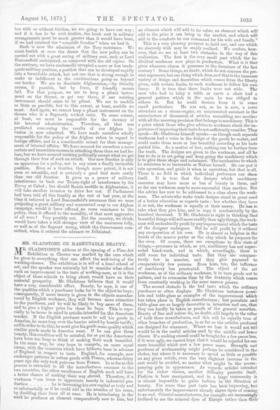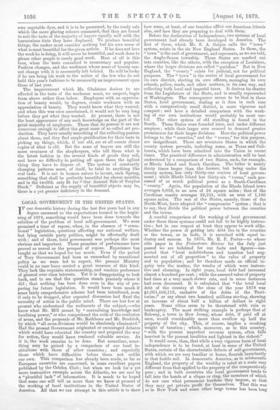MR. GLADSTONE ON MARKETABLE BEAUTY:
MR. GLADSTONE'S address at the opening of a Fine-Art Exhibition at Chester was marked by the care which he gives to everything that can affect the well-being of the working-classes. The exhibition is in aid of a local school of art, and the speaker was naturally led to consider what effect such an improvement in the taste of working-men, as it is the object of these schools to bring about, would, have on their material prosperity. Mr. Gladstone believes that it would have a very considerable effect. Beauty, he says, is one of the qualities which a purchaser looks for in the object he buys ; consequently, if more beauty is given to the objects manufac- tured by English workmen, they will become more attractive to the purchaser, and he will be likely to buy more of them, and to give a higher price for those he buys. This is espe- cially to be borne in mind in articles intended for the American market. If the English producer wants to sell his goods in America, he must leap over the barrier raised by hostile tariffs ; and in order to do this,he must give his goods some quality which similar goods made in America want. If he can give them beauty, this condition will be satisfied, for as yet the Americans have been too busy to think of making their work beautiful. In the same way, he may hope to compete, on more equal terms, with the countries which have hitherto been in advance of England in respect to taste. England, for example, now exchanges patterns in cotton goods with France, whereas thirty years ago she only took patterns from France. In so far as this process is extended to all the manufactures common to the two countries, the other excellences of English work will have a better chance of making their way abroad. Therefore, if a workman "can learn to appreciate beauty in industrial pro- duction . . . . . . he is increasing his own capital as truly and as substantially as if he could add to the musclee of his arms, by doubling their force all at once. He is introducing in the work he produces an element comparatively new to him, but
an element which will add to its value, an element which will add to the price it can bring in the market, and which will add to the comforts he can command for his wife and family." This is a very pleasing prospect to hold out, and one which
we sincerely wish may be amply realised. We confess, how- ever, that we see at least two obstacles in the way of this realisation. The first is the very small part which the in- dividual workman now plays in production. What is it that gives whatever charm it possesses to the furniture of the last century ? Some things, no doubt, which do not concern the pre- sent argument, but one thing which does, and that is the immense variety of design and decoration which comes from the liberty given, with certain limits, to each workman to follow his own fancy. It is true that these limits were not wide. The man who had to inlay a table or carve a chair had a general pattern which in the main he was obliged to adhere to. But he could deviate from it in some small particulars. He was not, as he is now, a mere attendant on a steam-engine, an uninterested assistant in the manufacture of thousands of articles resembling one another with all the unerring precision that belongs to machinery. This is a point which those who give advice to workmen about the im- portance of improving their taste do not sufficiently consider. They speak—Mr. Gladstone himself speaks—as though each separate workman had a voice in the design of the goods he makes, and could make them more or less beautiful according as his taste guided him. As a matter of fact, nothing can be further from the truth. The designs are given to the workman, and all he has to do is to set going and keep going the machinery which is to give them shape and substance. The mechanism to which he ministers is as inexorable as Nature herself. He can put it into operation, and guide it when in operation, but that is all. There is no field in which individual preference can show itself. It is true that the designs which machinery executes may have more or less of beauty in them, and so far one workman maybe more successful than another. But the advice has now to be addressed to a class above the work- man. The artists who make trade designs stand in great need of a better education as regards taste ; but whether they have it or not, the workman is equally at their mercy. He has to take what they give him, and to copy it mechanically by the hundred thousand. If Mr. Gladstone is right in thinking that beautiful things will sell more readily than ugly things, the work- man will undoubtedly profit by any improvement which the taste of the designer undergoes. But he will profit by it without any co-operation of his own. He is almost as helpless in the hands of the master potter as the clay which he prepares for the oven. Of course, there are exceptions to this state of things,—processes in which, as yet, machinery has not super- seded hand-work, and in which, accordingly, there is still room for individual taste. But they are compara- tively few in number, and they give payment to comparatively few persons. Even here, too, the influence of machinery has penetrated. The object of the art workman, as of the ordinary workman, is to turn goods out to pattern, and to economise time by the dexterity which comes from constantly working in the same narrow groove.
The second obstacle is the bad taste which the ordinary purchaser so often displays. Mr. Gladstone instances porce- lain and table-glass as examples of the improvement which has taken place in English manufactures; but porcelain and table-glass are BO largely decorative in intention and use, that they can hardly be taken as proofs of the general assertion. Beauty of line and colour do, no doubt, add largely to the value of both these manufactures, and this will be equally true of other branches of production, in so far as the articles produced are designed for ornament. Where we fear it would not tell would be in the useful articles used by the middle and lower classes. If a cooking utensil could be bought for a few pence'less, if it were ugly, we cannot hope that it would be rejected for one and more beautiful which cost a few pence more. Strength
goodness of workmanship might perhaps be considered in the choice, but where it is necessary to spend as little as possible on any given article, even the very slightest increase in the cost would be avoided, no matter what might be the accom- panying gain in appearance. As regards articles intended for the richer classes, another difficulty presents itself. Fashion is here omnipotent, and in a large community it is almost impossible to guide fashion in the direction of beauty. For some time past taste has been improving, but unfortunately the improvement already shows signs of coming to an end. Oriental manufacturers, for example, are increasingly inclined to use the mineral dyes of Europe rather than eleir own vegetable dyes, and it is to be presumed, by the ready sale which the more glaring colours command, that they are found to suit the taste of the majority of buyers equally well with the harmonious tints they have displaced. To produce beautiful things, the maker must consider nothing but his own sense of what is most beautiful for the given article. If he does not love the work he is doing, it will never be beautiful, and work done to please other people is rarely good work. Most of all is this true, when the taste consulted is momentary and popular. Fashion changes, and the workman whose sense of beauty can- not change with it is necessarily left behind. He will be lucky if he can bring his work to the notice of the few who do not hold this year's fashions to be necessarily an improvement upon those of last year. The improvement which Mr. Gladstone desires to see effected in the taste of the workman must, we suspect, begin from above rather than below. Employers with an apprecia- tion of beauty would, by degrees, create workmen with an appreciation of beauty. They would know what they wanted, and when this was once ascertained, it would not be very long before they got what they wanted. At present, there is not the least appearance of any such knowledge on the part of the great majority of eMployers. Those that do possess it are not numerous enough to affect the great mass of so-called art pro- duction. They have usually something of the collecting passion about them, and they find ample gratification for their taste in picking up things, which, if not old, are at all events direct copies of what is old. But the mass of buyers are still the mere creatures of the shopkeepers, who tell them what is the latest fashion in the several kinds of goods they sell, and have no difficulty in putting off upon them the ugliest thing they have to dispose of. The system of constantly changing patterns must, of itself, be fatal to anything like real taste. It is not in human nature to invent, each Spring, something that shall be perfectly beautiful for eleven months, and in the twelfth only fit for " Our Annual Sale of Surplus Stock." Deficient as the supply of beautiful objects may be, *there is a yet greater deficiency in the demand.



































 Previous page
Previous page